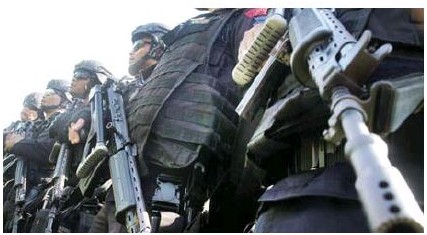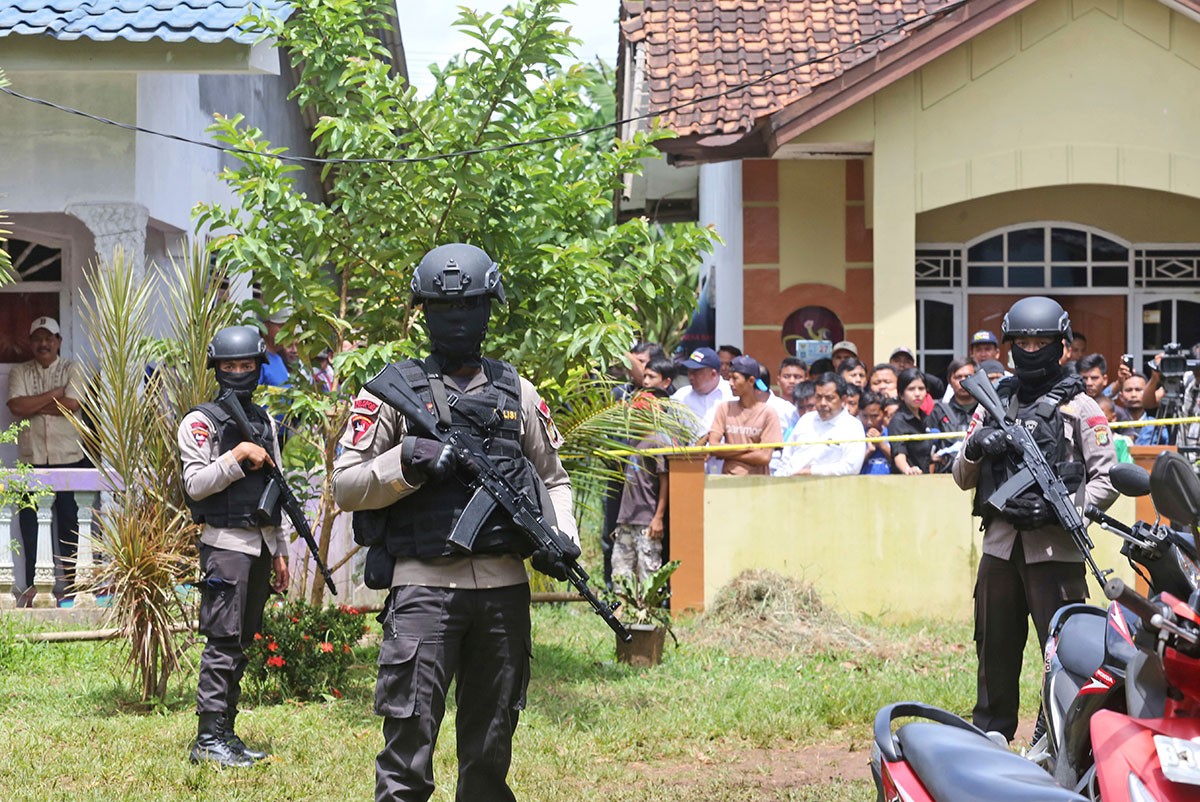Police step up cyberoperation
The recent terrorism plots foiled by the police’s counterterrorism squad all have the same feature: They were inspired and orchestrated remotely by an Indonesian militant with the Islamic State (IS) group in Syria.
Change Size
 Candlelight operation: A police bomb squad joins the launch of Operation Lilin Agung 2016 at Puputan Margarana field in Denpasar, Bali, on Thursday. Local authorities have heightened security measures, including the deployment of Pecalang public order personnel, ahead of Christmas and New Year’s Eve celebrations. (JP/Zul Trio Anggono)
Candlelight operation: A police bomb squad joins the launch of Operation Lilin Agung 2016 at Puputan Margarana field in Denpasar, Bali, on Thursday. Local authorities have heightened security measures, including the deployment of Pecalang public order personnel, ahead of Christmas and New Year’s Eve celebrations. (JP/Zul Trio Anggono)
The recent terrorism plots foiled by the police’s counterterrorism squad all have the same feature: They were inspired and orchestrated remotely by an Indonesian militant with the Islamic State (IS) group in Syria.
The 33-year-old militant, Bahrun Naim, who is known to be tech-savvy, allegedly managed to recruit new militants and created a number of new terrorist cells across the country through online chat groups.
Terrorist groups, the police have said, are now engaging in cyber-jihad, which includes activities such as recruitment of followers, online training on bomb making and the spread of radical thought to potential followers, as well as the transfer of money from jihadists overseas to Indonesian extremists.
In the past 12 days following the foiled plot to attack the State Palace on Dec. 10, the nation’s counterterrorism squad, Densus 88, has uncovered at least 13 terrorist cells in West Java, Central Java, Banten, North Sumatra, West Sumatra and Batam, arresting a total of 21 people who had allegedly planned attacks during Christmas and New Year’s Eve this year.
(Read also: High explosive bomb prepared to attack State Palace)
The raids were only possible because the police had stepped up their cybersurveillance, National Police chief Gen. Tito Karnavian said on Thursday. “This is the result of launching massive cybercounterterrorism as we are really concerned about what’s going on in the cyberworld. We have been stepping up efforts for cybersurveillance on them [terrorist groups],” he added.
Tito said that the police’s cybertroops worked every day to monitor and track activities of radical groups on the internet. Its members usually create fake accounts so that they could join chat rooms of terrorist groups after they introduce themselves as potential followers.
Participants of the online chatting, the police chief said, would later exchange phone numbers so that the cybertroops could join their Whatsapp groups for daily conversations among suspected terrorists to find out where they might launch attacks and with which other terrorist groups they actively communicate.
“These kinds of cyberpatrolling techniques are actually the same as the methods in undercover activities in the real world,” Tito said, adding that the only difference was they were conducted online.
Tito, however, admitted that the cybertroops had difficulties monitoring terrorism plots that were devised by lone wolves, as they usually did not join any terrorist group chats online. “Lone wolves independently study from the internet and carry out attacks alone,” Tito said, adding that Densus 88 had arrested a total of 40 suspected terrorists this year.
(Read also: Terrorists targeting police in foiled Banten terror plot)

From the recent arrests, the police identified three terrorism plots devised by followers of the arrested Bahrun. They were allegedly planning to attack the State Palace, a police station in Tangerang, and an unspecified location in Bali.
“We have arrested members of the group that wanted to attack Bali. The female [alleged suicide bomber intended for an attack in Bali] has also been arrested,” the police chief said.
Of the 23 terrorists Densus 88 arrested recently, two were women who were alleged to be suicide bombers, namely Dian Yulia Novia and Ika Puspitasari. Bahrun had allegedly assigned Dian to attack the State Palace and Ika to undertake the attack in Bali.
Densus 88 has reportedly arrested about 1,000 terrorists since its establishment in 2004 and since the deadly JW Marriot Hotel bombing it has derailed a total of 50 terrorism plots.
Terrorism expert Noor Huda said that the fast growing use of social media had changed discourse on terrorist activities in Indonesia.
In the past, would-be terrorists would have had to join major radical groups like Jamaah Islammiya (JI), Jamaah Ansharut Tauhid (JAT), or Jamaah Ansharut Daulah (JAD) to be involved in terrorism, but nowadays with the help of the internet they are able to establish small cells quickly after chatting with people with similar visions online.
“[Under the new discourse], some easily become members of unknown groups, although they have never met each other. This has been proven in the case of Dian who was exposed to radicalism through Facebook and got connected with Bahrun’s network,” Noor said.
Officers infiltrate chat groups to track terrorism plots Cybersurveillance cannot detect lone wolves, police chief says









